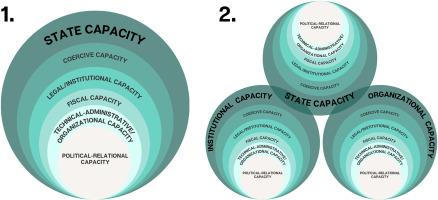灾害风险管理方面的国家、机构和组织能力
IF 4.5
1区 地球科学
Q1 GEOSCIENCES, MULTIDISCIPLINARY
International journal of disaster risk reduction
Pub Date : 2025-08-30
DOI:10.1016/j.ijdrr.2025.105777
引用次数: 0
摘要
本研究分析了在灾害研究中国家、机构和组织的能力是如何接近的。它分析了2012年至2023年间发表的404篇文章。自2019冠状病毒病大流行开始的2020年以来,关于国家、机构和组织灾害风险管理能力的出版物大幅增加。在分析的404篇文章中,74篇直接讨论了DRM背景下的国家、机构或组织能力。分析表明,大多数研究没有明确界定国家、机构和组织的能力。这些概念的区别也存在歧义,并且缺乏可操作的定义,这可能会影响DRM策略和实践的开发。与反应性应急行动有关的能力是研究最多的。与这些能力最常相关的因素包括政治特征、行政技能、人力和财政资源、社会参与和合作。本文章由计算机程序翻译,如有差异,请以英文原文为准。

State, institutional and organizational capacities in disaster risk management
This study analyzes how state, institutional, and organizational capacities are approached in disaster studies. It analyzed 404 articles published between 2012 and 2023. There has been a significant increase in publications on state, institutional, and organizational capacities in disaster risk management (DRM) since 2020, the beginning of the Covid-19 pandemic. Of 404 articles analyzed, 74 directly addressed state, institutional, or organizational capacities in the context of DRM. The analysis revealed that most studies do not clearly define state, institutional, and organizational capacities. There is also an ambiguity in the distinction of these concepts, and lack of operational definitions, which can affect the development of DRM policies and practices. Capacities related to reactive emergency response actions are the most studied. The factors most frequently associated with these capacities include political characteristics, administrative skills, human and financial resources, social participation, and cooperation.
求助全文
通过发布文献求助,成功后即可免费获取论文全文。
去求助
来源期刊

International journal of disaster risk reduction
GEOSCIENCES, MULTIDISCIPLINARYMETEOROLOGY-METEOROLOGY & ATMOSPHERIC SCIENCES
CiteScore
8.70
自引率
18.00%
发文量
688
审稿时长
79 days
期刊介绍:
The International Journal of Disaster Risk Reduction (IJDRR) is the journal for researchers, policymakers and practitioners across diverse disciplines: earth sciences and their implications; environmental sciences; engineering; urban studies; geography; and the social sciences. IJDRR publishes fundamental and applied research, critical reviews, policy papers and case studies with a particular focus on multi-disciplinary research that aims to reduce the impact of natural, technological, social and intentional disasters. IJDRR stimulates exchange of ideas and knowledge transfer on disaster research, mitigation, adaptation, prevention and risk reduction at all geographical scales: local, national and international.
Key topics:-
-multifaceted disaster and cascading disasters
-the development of disaster risk reduction strategies and techniques
-discussion and development of effective warning and educational systems for risk management at all levels
-disasters associated with climate change
-vulnerability analysis and vulnerability trends
-emerging risks
-resilience against disasters.
The journal particularly encourages papers that approach risk from a multi-disciplinary perspective.
 求助内容:
求助内容: 应助结果提醒方式:
应助结果提醒方式:


